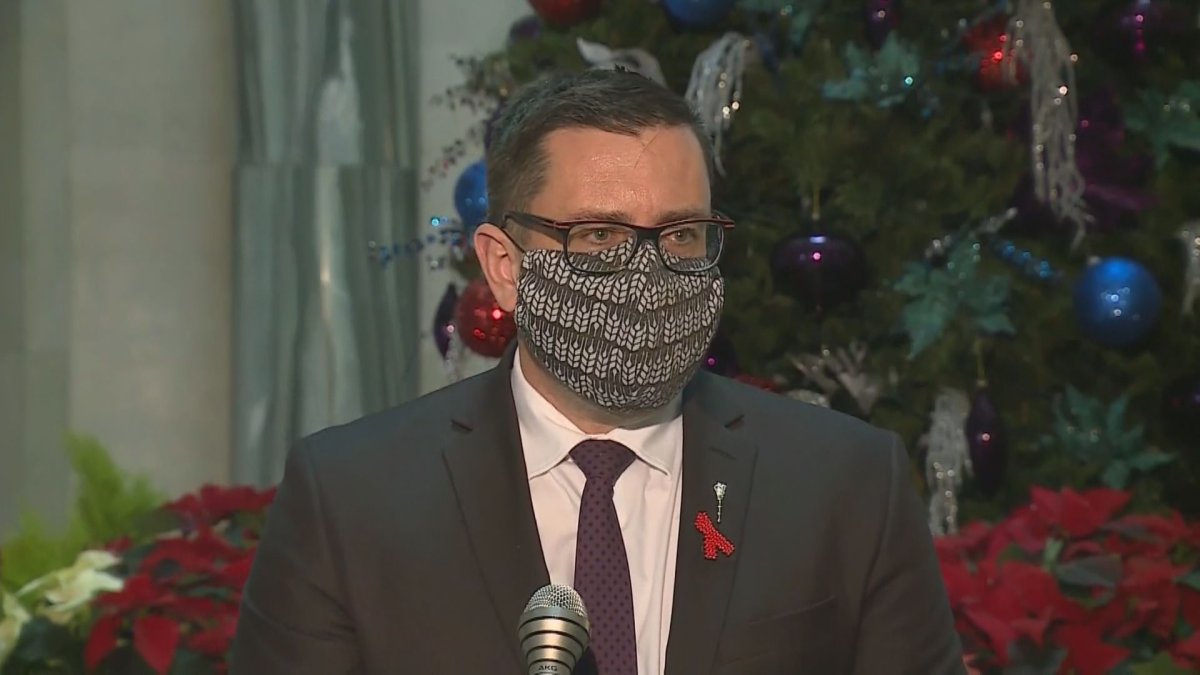Saskatchewan’s Health Minister says a measure of his government’s success in responding to COVID-19 is polling data.

Paul Merriman was asked Thursday how the Saskatchewan Party government measures its success in dealing with the novel coronavirus.
He said a recent poll released by the Angus Reid Institute shows favourable results for the province.
“We are one of the best jurisdictions, if not the best jurisdiction, that has handled COVID in balancing the economy, people’s mental health and within our health-care system,” Merriman told reporters on the final day of the legislature sitting.
“So very proud of that.”
Merriman and his staff didn’t say what poll he was referring to. But an Angus Reid poll released Thursday said 55 per cent of 497 respondents polled in Saskatchewan in November think the province is doing a “good job” handling COVID-19. It was 77 per cent in June.
Saskatchewan’s seven-day average for daily COVID-19 cases sits at 283 and the province has the second-highest rate of active cases per capita in Canada, behind Alberta.
The province plans to have hundreds more health-care workers help with the pandemic, given weeks of high case numbers. Officials have warned the virus is spreading at a rate that isn’t sustainable for the health system.
- Canada Post says no ‘major breakthrough’ in talks as strike enters 2nd week
- Canada’s military head defends women’s role in combat against U.S. comments
- Canadian politicians condemn ‘anti-Semitism’, ‘anarchy’ at Montreal protests
- Why is inflation heating up at the grocery store again? Blame the loonie
Saskatchewan reported another 324 new infections Thursday and four more deaths, bringing the province’s pandemic death toll to 75.
There were 138 people in hospital being treated for the virus, with 31 of them receiving intensive care.

Get weekly health news
Saskatchewan is the only western province that has yet to announce what public-health orders will be in place over the holidays.
Premier Scott Moe said officials are discussing whether more restrictions should be brought in to slow the virus’s spread.
“We probably are looking more towards, at the minimum, status quo and likely even looking at some potential tweaking or some additions to those measures,” he said Thursday, following a virtual premiers’ meeting with Prime Minister Justin Trudeau about vaccines and health-care costs.
In November, Moe made it a rule to wear masks in indoor public places, banned team sports and capped capacity at public venues like churches, movie theatres and casinos to 30 people.
No more than four people are allowed to sit together at restaurants and bars, and large retailers also have to restrict their capacity to 50 per cent. No more than five people are permitted to gather inside a home.
Merriman said exactly what rules will be in place over the holidays is to be revealed next week and that he had to meet with the province’s chief medical health officer, who is to present recommendations.
“Our goal right now is to flatten the curve and to start reducing our numbers and the best way of doing that is adhering to the public health guidelines. That’s our goal,” Merriman said.
“Ultimately all the decisions around the pandemic are the government’s decision, but we do that strictly in consultation with our chief medical health officer.”
The day before, Moe said it is unlikely there will be a loosening of some public-health rules to allow more people to gather at Christmas, either in households or long-term care homes.
The Opposition NDP raised concerns about COVID-19 outbreaks declared at 14 long-term care homes in the province, including the Parkside Extendicare home in Regina, where 11 residents have died and another 149 have tested positive for the virus.
The Saskatchewan Health Authority has prohibited visits to long-term and personal care homes, except on compassionate grounds. It says it’s supporting facilities with outbreaks that need help.

Questions about COVID-19? Here are some things you need to know:
Symptoms can include fever, cough and difficulty breathing — very similar to a cold or flu. Some people can develop a more severe illness. People most at risk of this include older adults and people with severe chronic medical conditions like heart, lung or kidney disease. If you develop symptoms, contact public health authorities.
To prevent the virus from spreading, experts recommend frequent handwashing and coughing into your sleeve. They also recommend minimizing contact with others, staying home as much as possible and maintaining a distance of two metres from other people if you go out. In situations where you can’t keep a safe distance from others, public health officials recommend the use of a non-medical face mask or covering to prevent spreading the respiratory droplets that can carry the virus. In some provinces and municipalities across the country, masks or face coverings are now mandatory in indoor public spaces.
For full COVID-19 coverage from Global News, click here.






Comments